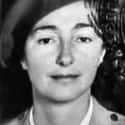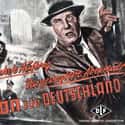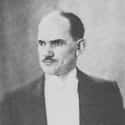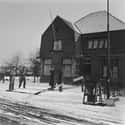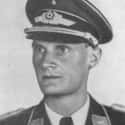-
(#8) Moe Berg Was a Major League Spy Who Almost Assassinated Werner Heisenberg
Morris "Moe" Berg was an accomplished athlete and graduate of Princeton University who played and coached professional baseball from 1923 to 1941. Because Berg was quite intelligent and multilingual, he made two trips to Japan, accompanying other players on an exhibition game tour of the country. On one of these trips in 1934, Berg brought a movie camera and filmed the city of Tokyo and its harbor from a hospital rooftop, footage that would eventually become strategically valuable.
Berg was an average player, but he did obtain a law degree and eventually passed the bar exam. When war broke out, Berg got involved in various counter-intelligence efforts and even provided his film footage to the Army unit that planned Doolittle's Tokyo Raid of 1942. He was eventually parachuted into enemy territory in Yugoslavia, interacting with Yugoslav partisans.
Berg was also charged with determining German progress toward the construction of atomic weapons, focusing especially on knowledge concerning German physicist Werner Heisenberg. In a mission to Zurich, Berg was to kill Heisenberg, who was delivering a lecture, if Berg determined that a German device was imminent. Berg concluded correctly that that was not the case and Heisenberg escaped violence.
After the war, Berg was awarded the Medal of Freedom, which he refused, the first incident of his increasingly odd behavior. He refused requests to return to baseball, law firms, or even teaching. As a Jew, he requested that the CIA send him to Israel - they refused but, in 1951, they did retain him to gather intelligence in Europe. He did little work and the CIA cut him loose when his $10,000 contract expired. For the next twenty years he lived with friends and relatives, intimating that he was working on top secret missions but essentially doing nothing. He died at age 70 in 1972; his sister accepted his Medal of Freedom posthumously. His baseball card is on display at CIA headquarters in Langley, Virginia.
-
(#2) Krystyna Skarbek AKA Christine Granville AKA Miss Poland Was a Spy and a Beauty Queen
Krystyna Skarbek was born in Poland in 1908. In 1930, she was a runner up in Miss Poland contest and was already involved in her second marriage when Germany invaded Poland in 1939.
The couple emigrated to London where Krystyna went to work for British intelligence.
Skarbek was able to establish a courier system from Poland to Hungary. Fluent in French, she was parachuted into France in 1944, with her new nom de guerre, "Christine Granville."
She engaged in various intelligence operations, the most famous an incident in Digne, France, where she tricked the Gestapo into believing her cover story and convinced them to release two other captured agents, despite the fact that her picture was on wanted posters all over the German headquarters.
Despite being awarded the George Medal, the OBE, and the Croix de Guerre, Skarbek was cut loose by the British government after the war, could not return to Communist Poland, and fell upon hard times. Employed as a stewardess for a cruise ship, she was living in a hotel in 1952 when she was stabbed to death by a rejected suitor, Dennis Muldowney. Muldowney was ultimately hanged and Krystyna was buried in London.
-
(#7) Two Nazi Spies Traveled to Small-Town Maine by Submarine
Operation Magpie was an attempt by the Nazis to determine the progress of the Manhattan Project by infiltrating Erich Gimpel and William Colepaugh, two men off-loaded by submarine in November 1944, near the town of Hancock, Maine.
As unlikely as a submarine drop-off was along the Maine coast, even more unlikely was the background of Colepaugh, an American who had defected from a Swedish ship in Lisbon in early 1944. He walked into the German embassy and declared that he wanted to help Germany win the war. By November, he was hunkered down in a North American-bound U-Boat with Gimpel, a much more accomplished spy with espionage background in South America. It was presumed that Colepaugh, with his knowledge of American mores, would be able to maneuver Gimpel through any cultural barriers.
The two landed on the snowy Maine coast, fortuitously able to hail a cab to a train station in Bangor. Within two days, they made it to New York and actually rented an apartment in Manhattan. Money was no object: Colepaugh had somehow convinced his handlers that it would take $60,000 to finance the mission ($650,000 today).
In the end, this money would be the mission's undoing. Colepaugh abandoned Gimpel, stole much of the cash, and went on a drunken bender that resulted in both of the spies' arrest by December 30. The saboteurs were tried and initially sentenced to death in early 1945, but Harry Truman commuted both sentences. Gimpel was paroled to West Germany and died in Brazil in 2010, aged 100. Colepaugh was paroled and died in suburban Philadelphia in 2005.
-
(#9) "Cicero" Photographed and Sold Top Secret Documents Just for the Money
Elyesa Basna was an Albanian national who managed to learn how to speak French, mostly as a result of a three-year stint in a French penal camp in Marseilles. In mid-July of 1943, without a background check, Basna was hired in Ankara, as a valet by the British Ambassador to Turkey. This after he had already been fired from the German embassy for reading official communications. The British Ambassador, Sir Hughe Knatchbull-Hugessen, had the unfortunate habit of taking classified documents home with him, and much of this information highly desirable.
Basna (code named "Cicero") photographed and sold top secret documents to Germany throughout 1944, strictly because he needed the money; he would be paid the highest amount ever paid to a spy up until the 1940s. He would also eventually be compromised by the veracity of his information that indicated to British intelligence that a leak existed in the Ankara embassy. He narrowly avoided detection during the war; afterwards his attempts at various business ventures failed, mostly because the money he had been paid by the Nazis was counterfeit. He emigrated to West Germany, spent the rest of his days as a night watchmen, unsuccessfully suing the government for the compensation he felt that he was owed.
-
(#11) British Spies Were the Victims of a Nazi Black Ops Attack
In mid-September 1939, British intelligence in the Netherlands were receiving various covert contacts from various individuals claiming to be interested in a negotiated peace. Some of these were legitimate German military figures, alarmed by the declaration of war and disgruntled with Hitler and his government. However, one of these individuals, a German émigré named Franz Fisher, was an operative for the German SD intelligence unit who had ingratiated himself with British intelligence.
He eventually was able to coordinate meetings between two British agents, Sigismund Payne Best and Richard Stevens, and what they thought was a high-level back channel to potential military dissidents. In actuality they were meeting with the notorious SS counter-espionage Colonel Walter Schellenberg, a direct report to Himmler and Heydrich. Initially, it is believed that the mission was a Nazi operation to identify disloyal Germans within their own government. However, on November 8, an attempt to assassinate Hitler with a bomb planted by a carpenter named Georg Elser prompted Heinrich Himmler to exploit this situation.
Meetings between the two factions had typically occurred in a cafe at Venlo, near the Dutch-German border. On November 9, Best and Stevens were scheduled to meet Schellenberg for another discussion; instead, a dozen armed SD forcibly abducted the two British agents and spirited them over the border. Hitler was convinced that Elser, a simple laborer, could not have pulled off his mission alone. The Germans also wished to stir up anti-British sentiment in Germany, which was already apprehensive after the initial success in Poland.
Nazi newspapers eventually proclaimed the connection between Elser and the British government. Plans for a show trial of the three conspirators were contemplated but never happened for many reasons, one being that any connection between the British and Elser was patently ridiculous. Elser was executed at Dachau in April of 1945; Stevens and Best were imprisoned in several concentration camps but managed to survive the war.
-
(#5) Americans and Germans Combined to Form the Red Orchestra to Combat Nazis
Harro and Libertas Schulze-Boysen were committed anti-Nazis who formed an espionage ring referred to by the Gestapo as the Red Orchestra. This was because an investigation determined that this group was "singing" to Soviet Russia. Both Harro and Libertas came from upper-class German backgrounds, Harro the son of a decorated naval officer and Libertas, the daughter of German nobility.
Harro, through his family connections, was able to secure a position in the Reich Air Ministry in 1934, but he and his wife organized an intellectual circle of like-minded anti-Nazis which included a member of another prominent German family, Arvid Harnack, and his American wife Mildred.
By the late thirties, their private opposition to the Nazis had morphed into actual espionage, with valuable information passed along to both the American and Soviet governments, including a warning concerning the 1941 invasion of the Soviet Union, which Stalin ignored. Libertas, through her position in the German film industry, was assembling graphic evidence of German war atrocities. This information passed by radio through Soviet agent Leopold Trepper into Brussels, where a Trepper operative foolishly transmitted from the same location for a week. Gestapo counterintelligence electronically located Trepper's group in 1941, arrested them, and decoded the names and addresses of the Schulze-Boysens among many others by mid-1942.
The Gestapo watched throughout the summer, identifying other members of the ring. Finally, on August 31, 1942, Harro was arrested at the Air Ministry. Libertas attempted to flee by train but was arrested on September 9. They were tried, convicted, and condemned on December 19, 1942. Because Goering and Hitler were especially outraged by such a betrayal by the upper class, Harro, Arvid Harnack, and other male defendants would be executed by a new, painful, and more degrading form of execution: death by hanging at the execution chamber at Plotzensee Prison. Female defendants like Libertas would be spared this fate: instead they would die by the current method already in place, death by guillotine.
The Schulze-Boysens and Harnack were executed within minutes of each other, three days before Christmas 1942 Mildred Harnack would initially receive a prison sentence, but Hitler refused to endorse this punishment. A native of Wisconsin, she would be retried and executed at Plotzensee on February 16, 1943.
New Random Displays Display All By Ranking
About This Tool
In order to obtain intelligence in the war, each country has trained a large number of spies, and some spies will even stay in the foreign country for 10 years or more. Excellent spies in Word War II have camouflage capabilities and wise reaction capabilities that make them difficult to detect, most of them have experienced cruel and harsh training before their operations.
During the Second World War, many outstanding spies who were loyal to the motherland were active in France, Germany, Britain, and other regions. Many of them have experienced numerous thrilling moments during the war years, but few people know their deeds. The random tool introduced 12 hardcore WWII spy stories you will be interested in.
Our data comes from Ranker, If you want to participate in the ranking of items displayed on this page, please click here.












